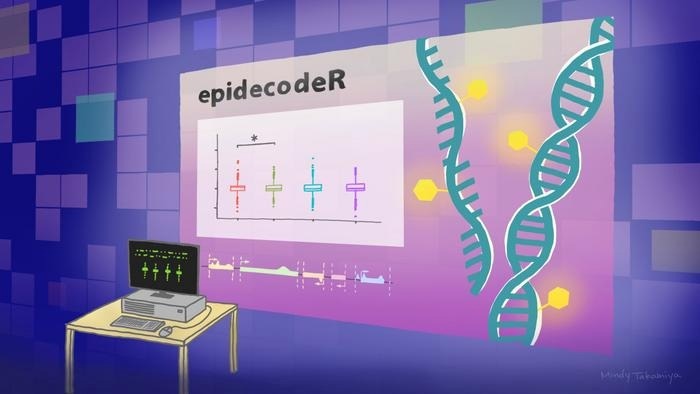In an effort to comprehend how the genetic makeup and environment interact to cause diseases, scientists have studied the structure, sequencing, and interactions of genetic material with proteins in great detail.
 'epidecodeR' is a tool that can streamline the analysis of complex epigenome and epitranscriptome data, allowing for the rapid and accurate prediction of the effects of epimarks on gene expression. Image Credit: Mindy Takamiya/Kyoto University iCeMS
'epidecodeR' is a tool that can streamline the analysis of complex epigenome and epitranscriptome data, allowing for the rapid and accurate prediction of the effects of epimarks on gene expression. Image Credit: Mindy Takamiya/Kyoto University iCeMS
“Epigenetic marks” are chemical alterations to DNA, RNA, and the related proteins (called histones), which have been the subject of some research.
Epigenetic marks affect the timing and mechanism of a gene on/off switching. Additionally, they have the ability to teach cells how to understand and apply genetic information, which can affect a variety of cellular functions.
Thus, modifications to epigenetic marks majorly affect cellular processes and gene regulation, suggesting they may be involved in disease. Researchers can shed light on the function of epigenetic markers in health and disease and possibly identify novel therapeutic targets by examining these marks.
Although scientists are able to recognize and contrast epigenetic marks, it is still difficult to comprehend how particular alterations relate to the functioning of genes. Drs Dan Ohtan Wang and Kandarp Joshi have developed a new tool called epidecodeR to aid in overcoming this. Biologists can now easily determine whether a modification impacts a gene's response to a given scenario by using this user-friendly tool published in Briefings in Bioinformatics.
If a positive correlation is found, this could motivate scientists to confirm the findings, helping them understand the role of these gene modifications in various conditions, including cancer and neurological disorders,” explains Joshi, a researcher at the Institute for Integrated Cell-Material Sciences (iCeMS)."
Dr Kandarp Joshi, Researcher, Institute for Integrated Cell-Material Sciences
The scientists categorized gene groups according to the number of modifications they had using statistical techniques. They demonstrated how EpidecodeR can forecast how particular modifications - like changing particular proteins or taking medications - may affect gene activity.
We used epidecodeR to successfully predict how a protein called histone deacetylase affects the activity of genes. We also found epidecodeR to be effective in identifying substances that can block another protein, called RNA demethylase, and we explored how changes in proteins called histones might be related to drug abuse.”
Dr Dan Ohtan Wang, Visiting Professor and Study Lead Author, Institute for Integrated Cell-Material Sciences
The researchers plan to conduct further studies to improve epidecodeR’s accuracy and specificity.
We want to include more details concerning where, how, and how many modifications occur in genes. As the data becomes more complex, we also aim to provide users with various statistical tests to enhance the capabilities of the tool.”
Dr Kandarp Joshi, Researcher, Institute for Integrated Cell-Material Sciences
Source:
Journal reference:
Joshi, K., et al., (2024) Development of ultrafast camera-based single fluorescent-molecule imaging for cell biology. Briefings in Bioinformatics. doi.org/10.1093/bib/bbad521